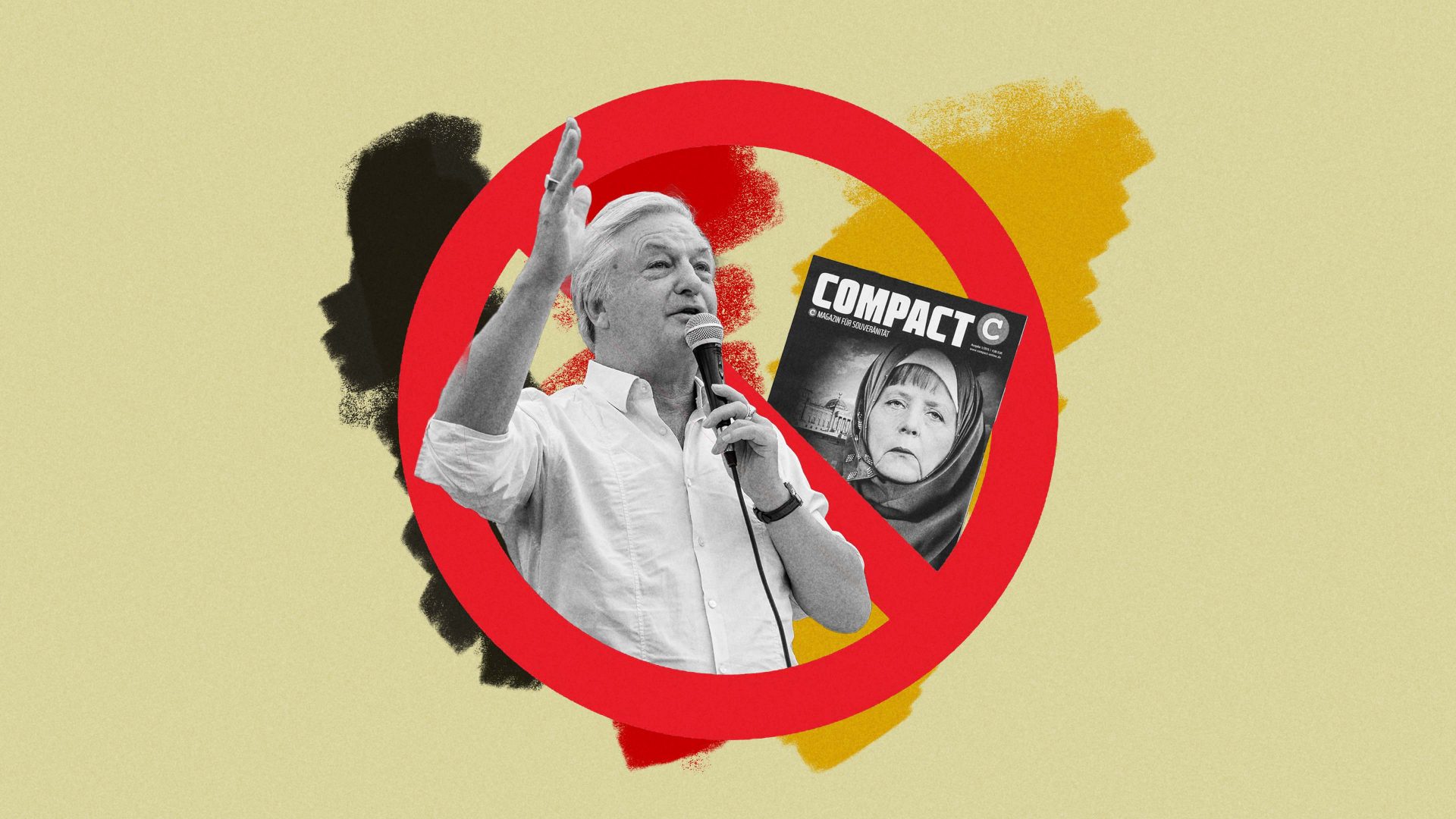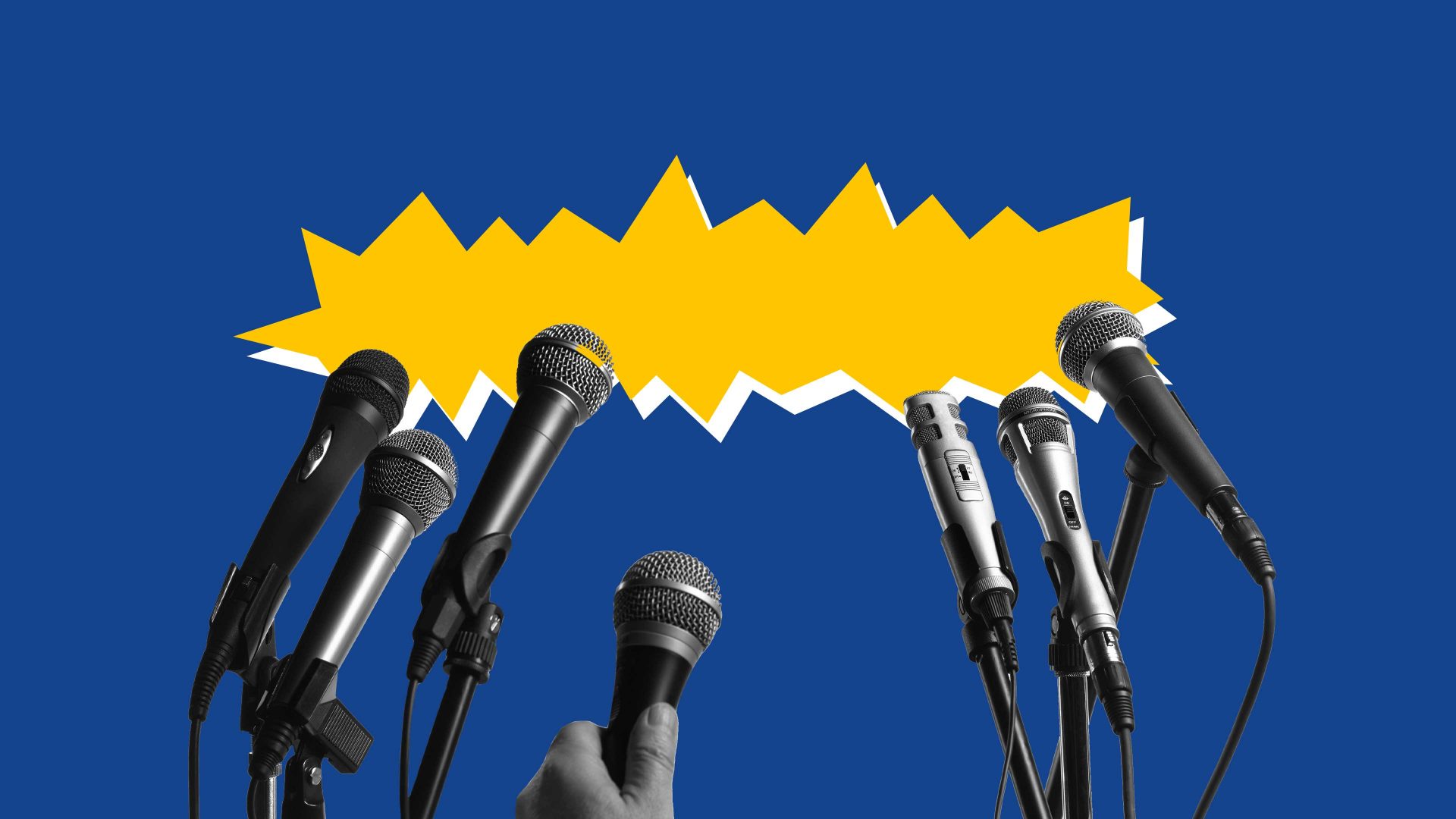The one time I bought Compact magazine at a Berlin station, I felt slightly disgusted with myself – for not having stolen it. I knew the €5.95 I’d just paid would land in the pockets of a pseudo-intellectual extremist called Jürgen Elsässer, its owner and editor. But I wanted to check it out first-hand, with even more disgust, until I threw it away.
To give you an idea of its content: Germany is a dictatorship. Merkel – “Mutti Multikulti”, the “queen of human traffickers” – had collaborated with the left to achieve Umvolkung, the great exchange of the indigenous Germanic nation. The Green Party business minister Robert Habeck was portrayed as “Morgenthau’s docile executor”, alluding to the plan to radically de-industrialise Germany after the second world war.
There’s a column by an Austrian neo-Nazi and stories about a “UFO conspiracy”, a “war against the unvaccinated” and one claiming Ursula von der Leyen is a Kriegshexe (warring witch), for supporting Ukraine. “Patriot Putin”, on the other hand, should be a “partner for Europe”.
Last week, the companies behind Compact and its online sites were banned. The prohibitory order states that the monthly magazine “regularly contains antisemitic, anti-minority, historically revisionist and conspiracy theory content”.
According to the Interior Ministry, this “mouthpiece of the extreme right propagates an ethnic-nationalist concept”, demeans ethnic groups, particularly those of Arab origin, and “agitates against parliamentary democracy in general and against the German government in particular”. Finally, according to the ministry, its reach (40,000 copies, one million views per YouTube video) and content make Compact a “central player” in the “new right” network. It is all true.
And yet I wasn’t overcome with joy, when I saw pictures of 67-year old Elsässer in his dark blue Bademantel with white edging, sleepily talking to a dozen policemen in balaclavas on his porch in Falkensee near Berlin.
Reporters had received a tip-off about the 6 o’clock raids, contributing to the social democrat interior minister Nancy Faeser’s PR coup. Two hundred policemen in the state of Brandenburg alone searched several premises, confiscating documents and assets.
AfD frontman Björn Höcke, in the farthest of Germany’s far right, will be saddened that the silver medals bearing his name and portrait aren’t sold by the Compact online shop (€74.95) anymore, as the site is down.
The reason I can’t gloat is that it’s a case of government banning an anti-
government publication (no matter how unsavoury). Which their tribe can denounce as an autocratic measure.
The Bundesverfassungsschutz, our domestic intelligence agency, had already classified Compact as extremist in 2021. In February this year, following the large pro-democratic rallies, station bookstalls kicked it from their shelves.
So one may wonder if the timing of the ban has to do with the three state elections in September, where Compact would have served as a campaign platform for AfD.
Among much applause for the ban, criticism was voiced immediately. From AfD officials, who compared it to GDR methods. But also from constitutional lawyers, the publishers’ association and journalists, all wholly unsuspicious of extremism, who raised doubts about the legality.
The measure is based on the Vereinsrecht, the law on associations, which are easier to prohibit than a press publication. In 2020, a high court decided that the law is applicable for media companies engaged in anti-constitutional activities, too, and upheld a ban against the radical left indymedia website.
With Compact, however, experts allege that the anti-constitutional rhetoric may be covered by the freedom of expression. Jürgen Elsässer, a former teacher who used to write for communist publications, clearly is a radical. In 2014 he ranted against the “globale Finanzelite” like this: “The crime has a name, an address and a telephone number. Rockefeller, Rothschild, Soros, Chodorkowski.”
Only last year, Elsässer said: “I’m a Putin supporter – with every kilometre the Russian troops advance, the day of German freedom comes closer”.
He delegitimises the government as “the regime”, which he openly vows to “overthrow”. But instead of investigating him for sedition, the government banned his magazine. A decision which the Federal Constitutional Court will look into very closely. As it should.
Germany has learnt the Weimar lesson that democracy must be combative and not be destroyed by the means provided by democracy itself. Bans, however, aren’t necessarily the best weapons in that fight.




